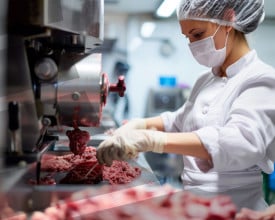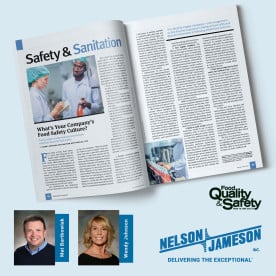food safety
- May 22, 2023
Strategic Expansion Offers Best-In-Class Solutions For Food Processors Nationwide
Marshfield, WI, April 17, 2023 – Nelson-Jameson, Inc., a leading distributor in the food processing industry, announced the acquisition of Sitzman Supply, LLC, a wholesale provider of process systems products located in Alden, New York. The acquisition is part of a long-term expansion plan that allows Nelson-Jameson to further develop its strategic relationships and offer additional technical sales coverage in the Eastern region.
Mike Rindy, Nelson-Jameson’s President, stated, “Nelson-Jameson is pleased to welcome Sitzman Supply to the family as a part of our national expansion. The synergies will allow us to better serve our customers, and the geographic growth demonstrates our commitment to the Eastern region. This expansion strengthens Nelson-Jameson's position as an industry leader that delivers supplies
- April 11, 2022
Nelson-Jameson is a proud member of the Innovation Center for US Dairy. The Center and its members have a common goal “to advance a shared social responsibility platform and demonstrate U.S. dairy’s collective commitment to provide the world responsibly produced dairy foods that nourish people, strengthen communities and foster a sustainable future.”
Nelson-Jameson and the Center have a combined passion for furthering food safety in our nation. Recently, the Center published a terrific food safety resource for the dairy industry that includes numerous Spanish language materials. Resources to take advantage of include: interactive training courses for artisan ice cream and cheesemakers, food safety plan writing assistance, training support, pathogen guidance documents, and much
- November 08, 2021
For many people throughout the United States, hunting wild game is a beloved pastime--whether for the enjoyment of the outdoors, thrill of the hunt, or an economical way to obtain food. Along with this hobby comes many safety precautions. Just as a hunter should be trained in firearm safety and first aid procedures, food safety is also important. Educating one’s self on the dangers of foodborne illness is one step closer to harvesting a game animal for safe consumption.
Know The Risks
Harmful bacteria such as Salmonella and E.coli can live in raw or undercooked game meats. It is important to note the stages in which contamination may occur, and what steps can be taken to ensure you have processed your animal in the safest means possible.Contamination can occur through the initial wound sustained by a bullet or an arrow. It is best to avoid hitting or puncturing the area around the stomach and intestines, as this would result in spoiling much of
- February 24, 2021
Not only has COVID put a significant dent in our social lives, but it also has impacted many operations and practices throughout food processing facilities. Unfortunately, this
- July 20, 2020
Have you ever missed one or two of your normal tooth-brushing sessions, and found your tongue traversing over a disconcertingly slimy layer coating your chompers? Well, welcome to the disturbing and quite fascinating world of biofilms. These hearty amalgams of microbiological activity provide both protection for microorganisms, as well as headaches for not only those avoiding plaque build-up, but most importantly for this blog, the food industry (allowing harborage and protection for bacteria and fungi).
Biofilms can form on a variety of surfaces in food processing environments, including stainless steel. A supercell of harborage, “Biofilms are complex microbial ecosystems formed by one or more species immersed in an extracellular matrix of different compositions depending on the type of food manufacturing environment and the colonizing species” (Geaile, et al). The
- July 01, 2020
Summer is here! What a perfect opportunity to get outside and enjoy the warm summer air we've all been craving! For some individuals, spending time outdoors could involve hiking, boating, or reading in the shade, but one thing we can all agree on, summer is the perfect time to enjoy some of our favorite foods on the grill. Whether with family, friends, or even coworkers, cooking food on the grill appears to be a popular summer activity. With summer holidays approaching, like the Fourth of July, it is important to keep your celebrations healthy and safe by following food safety tips to prevent contamination while grilling.
According to the FDA and the USDA Food Safety organizations
- June 23, 2020
A critical component in food safety is the detection of contaminants. One of the worst nightmares of anyone working in food processing, is finding something in the final product that is not supposed to be there. This can cause costly product loss, clean-up and maintenance costs, and the potential for recalls and/or litigation. Even though everyone tries to prevent foreign object contamination, pieces of tools such as scrapers can break off, or items such as pens can fall into the product. To make sure that these items are caught, and that contaminated product does not make it out the door, many plants utilize metal detection devices and products.
Metal detectable products are constructed of a few different materials. They are often blue for easy visual detection. Blue is also the most common non-food color.
- June 04, 2020
Food safety truly is a collective effort. From the farm to the table, ensuring food safety is a way we can reaffirm our investment in, and care
- December 03, 2019
Wash. Your. Hands. This simple act can do so much to prevent the spread of viruses and bacteria. Lately, this has been highlighted most unwelcomingly
- November 05, 2019
New York State, like many other areas in the US is firmly entrenched in the craft beer revolution. As Niall McCarthy chronicled on Forbes.com in April of 2019: “Back in 2008, small and independent brewers produced 8.5 million barrels of lager, stout, pale ale, India pale ale, porter and countless other varieties. By 2018, output climbed steeply to 25,917,766 barrels.” From Buffalo to Brooklyn, New York State’s craft industry continues to significantly contribute to that rise in production, from brewpub favorites to nationally-consumed brands.






